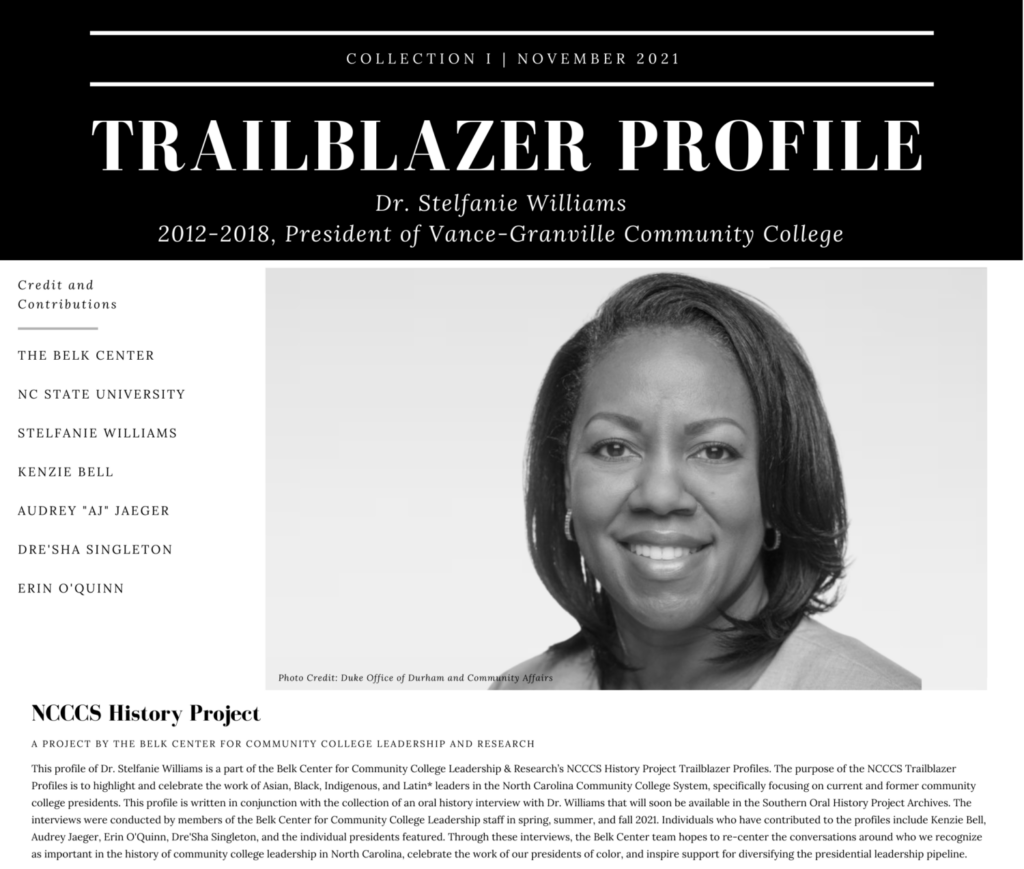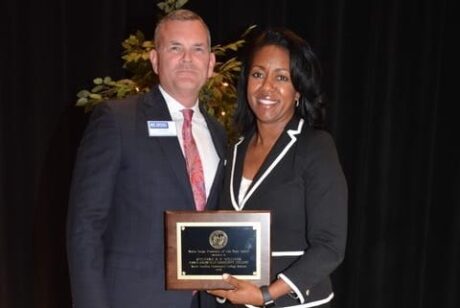Trailblazer Profile: Dr. Stelfanie Williams

Dr. Stelfanie Williams
When Dr. Stelfanie Williams, 2012-2018 president of Vance-Granville Community College, was in middle school, she learned that a beloved relative did not know how to read. Through this experience, she developed a passion for helping others through the power of education, which ultimately led to a career in the North Carolina Community College System.
Williams began her career as a basic skills instructor at Central Carolina Community College shortly after graduating from Duke University. Throughout college, she was involved in literacy service work, and after graduation, teaching adults to read at the community college seemed like a natural fit. In this first role, Williams fell in love with teaching and education – the beginning of many ways that she would relate learning to her life experiences.

As the daughter of two North Carolinians who migrated north for opportunities, she recognized the importance of access and equity. When her family returned to North Carolina years later, she benefited from diverse professional teachers in her schools and in the surrounding community. Williams attended public school during her formative years, encouraged by teachers in her neighborhood who showed interest in her success. She later attended a college preparatory boarding high school, where she was immersed in an environment of teaching and learning. “I learned that the difference maker really is having great teachers and supportive educators,” says Williams. “I also learned that being a great teacher comes from your engagement with students, and students really teach you everything you need to know,” she continued. This is the experience she wanted to provide to her own students.
Her early years of teaching served as inspiration when she started a family and continued her own education – allowing her to relate to the competing commitments that students often face. An advocate of experiential learning, Williams worked to make theory and subject matter applicable to the students’ interests and experiences, and to prepare them for fulfilling careers, family responsibilities and contributions to their communities.
After numerous roles in faculty and administration, in 2012, just a year after finishing her doctorate in adult and higher education at NC State, Williams was hired as the president of Vance-Granville Community College. Even as a college president, she continued to teach a college success course and relished opportunities to engage with students on campus. Williams was the first woman president and the first president of color to serve Vance-Granville Community College, which is made more significant by the fact that nearly 50 percent of the school’s student body is African American or Hispanic.
During her six years at Vance-Granville, Williams helped the college to make great strides in increasing access and equity for all students. Some of her many accomplishments include spearheading the development of the VanGuarantee, a college promise scholarship that has received national recognition, helping to develop career training programs in advanced manufacturing, expanding online course offerings through the Vanguard Online Learning through Technology (VOLT) initiative, and strengthening transfer partnerships with local four-year institutions. Most recently, Williams was thrilled to collaborate with NC Central University to provide courses on-campus at Vance-Granville.


The combined strength of Williams’ efforts resulted in the largest graduating classes in the college’s history in 2015 and 2016, and the largest number of associate degrees awarded in the college’s history in 2017. “It was wonderful to be in a system where my own core values aligned with the mission,” said Williams. “I could show up with my values and my experiences intact and then add value to all that the community college system, and in particular Vance-Granville Community College, offered and provided to the community.”
At the time of her presidential appointment, she was the only Black woman president in the N.C. Community College System. “I held the responsibility dearly of serving as a mentor to others, and I still do to this day,” says Williams. She views mentoring as both teaching and learning, and she maintains connections to various students and professionals that she has interacted with over the years, particularly emerging educational leaders. When asked what it means to her to have been the first woman and first African American to serve as the president of Vance-Granville, Williams says, “The role comes with responsibility to think long term, to be future oriented, to make decisions with students at the forefront but also to make decisions that, hopefully, will lay the groundwork for future opportunities for others.”
Her hard work at Vance-Granville has not gone unnoticed. In 2014, she was awarded with the I.E. Ready Distinguished Leadership Award from NC State, an award given annually to a community college leader, and named after the first president of the N.C.Community College System. In 2018, she was named President of the Year by the North Carolina State Board of Community Colleges. Williams has also been appointed to both Gov. Roy Cooper’s Governor’s Commission on Access to Sound Basic Education and the MyFutureNC commission.

Though Williams thrives on being in front of a classroom, working with students and colleagues, she also recognizes that leadership is a team effort. “It’s been an honor to be in leadership roles, to have been a president, to be able to represent an institution of such importance to the community. As much as I don’t like being in front of the camera, when I am, I’m often thinking about those who are not,” says Williams. “I have been reflecting quite a bit on all of the folks that have been a part of shaping me as a person and shaping the colleges where I’ve worked and led. I really just want to use this opportunity and platform to say thank you and to uplift the work that’s not always seen but certainly matters to all of the students who are in the community college system and beyond.”
While Williams deeply loves the North Carolina Community College System, she knows that the system must deepen its commitments to equity and diversity. “Every system and institution is best served by diversity and must ask itself questions about equity. I hope as the North Carolina Community College System continues to grow, that we will think about issues of students of color, underrepresented students, what their experiences and outcomes are, and how we can continue to work on the disparities in achievement and on future outcomes for those students.”

These days, it is rarer to find Williams in the halls of a community college, but this is not because she has stopped loving the work of supporting communities through higher education. In 2018, she took a role at her alma mater as the vice president for Durham affairs at Duke University. In this role, she is responsible for leading the university’s community efforts in economic development, affordable housing, early childhood, K-12 and workforce education, student engagement, neighborhood relations and community health. One key component of her work is building connections between Duke and other local education institutions, including Durham Public Schools, Durham Technical Community College and North Carolina Central University. “It’s been a privilege to be a bridge and to connect all of the various forms of education that we have in this wonderful state, whether it’s the applied programs or transfer or even the research-based opportunities at the university,” says Williams. “Really all of these educational institutions’ core mission is about the students but also about serving humanity. That is what I keep in mind at every stop along my professional journey– how do we serve humanity through these institutions and through the power of education?”
To Williams, regardless if she is serving as a basic skills teacher, a community college president or a university vice president, the heart of her work is around building and sustaining community. “For the time that those students are at a school and the educators are there contributing to the experience, it’s about creating a community and a supportive environment that leads to success.”
Collection I | November 2021